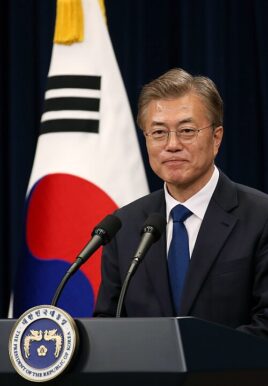The prosecution service of South Korea has charged former president Moon Jae-in with bribery in connection to the contentious appointment of his former son-in-law to a senior position at an airline. Allegations against Moon state that his son-in-law, referred to only by the surname Seo, was appointed as the executive director of Thai Eastar Jet in 2018, despite lacking significant experience in the aviation sector.
This appointment is alleged to have been made in return for the founder of Eastar Jet and former lawmaker Lee Sang-jik being appointed as the head of the state-run Korea SMEs and Startups Agency in the same year. Prosecutors assert that this arrangement was designed to provide indirect benefits to Moon. Between 2018 and 2020, Seo is reported to have received approximately 217 million won in salary and housing assistance. A report from Reuters, referenced by the prosecutors, indicated that Seo often neglected his responsibilities and did not fulfill his role adequately.
The controversy has implicated Lee Sang-jik, who was previously sentenced to six years in prison in 2022 for embezzlement. He is now confronted with new allegations of bribery and breach of trust. Recently, former President Yoon Suk Yeol was ousted from his position after imposing martial law, a decision that incited public indignation. He is also facing criminal charges.
Moon joins the ranks of Yoon and other former South Korean presidents who have encountered legal action. South Korea’s first female president, Park Geun-hye, was impeached in 2017 due to a prominent corruption scandal involving her associate Choi Soon-sil. She received a total sentence of 22 years in prison before being pardoned on health and humanitarian grounds in December 2021. Moon’s immediate predecessor, Lee Myung-bak, was found guilty of embezzlement and bribery, resulting in a 17-year sentence in 2018.
He was released early through a presidential pardon in 2022, also citing health concerns. Moon’s political mentor, Roh Moo-hyun, faced a corruption investigation related to his family after leaving office and tragically took his own life in 2009.
Earlier, former military leaders Chun Doo-hwan and Roh Tae-woo were convicted in 1996 for mutiny, treason, and corruption associated with the 1979 coup and the 1980 Gwangju massacre. Chun’s death sentence was later commuted to life imprisonment, while Roh received a 17-year sentence. Both were pardoned in 1997 as part of a national reconciliation initiative led by then-president Kim Young-sam, with the backing of president-elect Kim Dae-jung.






